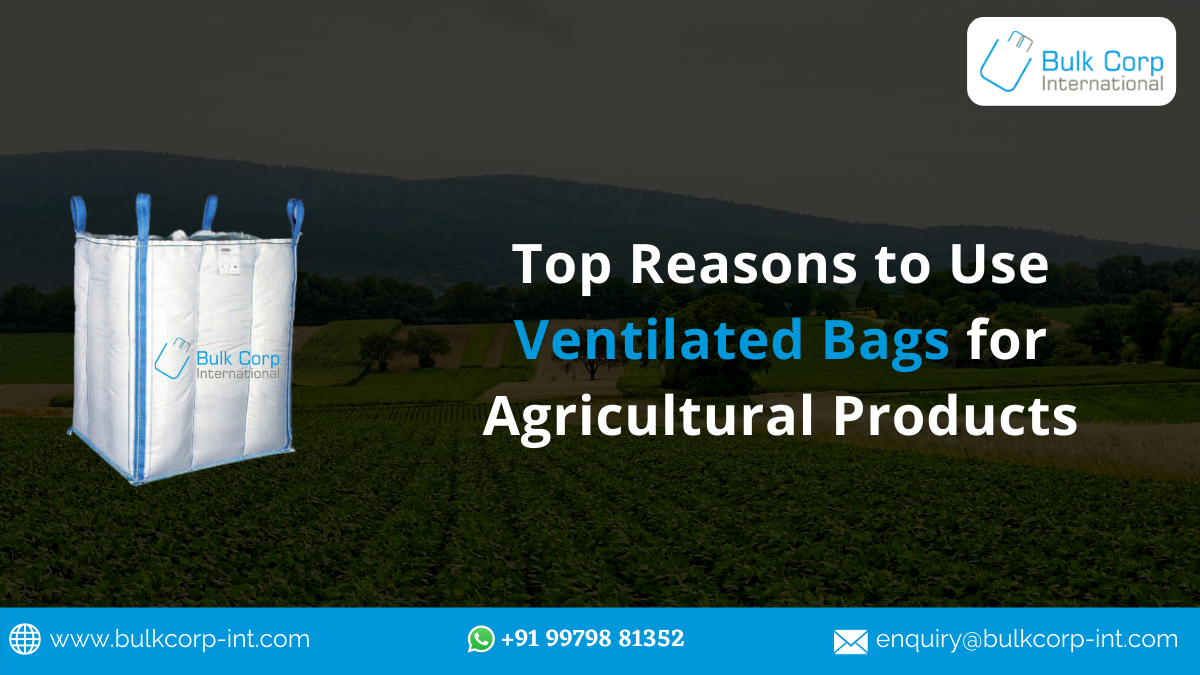Top Reasons to Use Ventilated Bags for Agricultural Products | Bulk Corp International
Post-harvest losses are one of the biggest banes for farmers across the world. According to the FAO (Food and Agriculture Organization of the UN), 45% of the world’s harvest of fresh produce like fruits and vegetables get damaged before they can even reach the end-consumer.
One of the main causes of these losses is incorrect storage conditions and logistic bottlenecks. In India alone, a whopping Rs. 92,651 crore per year is lost in post-harvest losses, mainly caused due to poor storage and transportation facilities. This is where the need for advanced packaging solutions like FIBC (Flexible Intermediate Bulk Container) Bags comes into play.
The use of Flexible Intermediate Bulk Containers, also known as Bulk Bags, Big Bags, and Jumbo Bags, is widespread in nearly every industry today due to their strength, durability, and versatility to address the unique storage needs for various sectors. FIBC bags come in a variety of different types, which makes them relevant for a wide range of applications.
Among the key FIBC products designed for the agricultural sector, the Ventilated Bags are especially meant for temporary storage and transportation of perishable goods such as potatoes, onions, garlic, and a host of other fruits, vegetables, and fresh horticultural produce.
Let’s dive deep to find out what makes Ventilated Bags a preferred choice for agro products.
They Have a Specialised Design
The biggest advantage of Ventilated Big Bags lie in their breathability. Therefore, a great emphasis is laid on the bag’s fabric design, which should allow the required airflow through the fabric into the bag.
These bags are often constructed with ventilation strips along all sides, which adds to their ability to provide good air circulation. They can be available in mesh, woven, and combination-type designs in breathable fabric or polypropylene. Because the design is so integral to the purpose of these bags, one must be careful to choose only trusted Ventilated Bags Manufacturers who are known for their quality and consistent products.
They protect your Temperature-Sensitive Goods during Transportation
It’s fairly common for perishable goods to experience temperature shock during transit, which makes them one of the most difficult agricultural products to move along the supply chain without damage.
Perishable products such as fresh fruits and vegetables cannot be shipped long distances without refrigeration. They need to be transported in chilled containers or trucks. But the unloading process after they reach their destination can expose them to relatively high ambient temperature. This temperature difference can be brutal for fresh produce. It may reduce their shelf life dramatically or render them completely useless for sale, incurring substantial costs.
Ventilated Bags provide a balanced temperature for the goods stored in them, lessening their risk of damage.
They Keep the Freshness Intact For a Longer Period
One of the major factors of decay and damage in perishable goods and fresh produce is condensation of moisture on them during long hours of transit. Humidity can make things worse by speeding up the ripening process, which can result in rotting.
Regular packaging cannot combat sweating and humidity and can lead to significant losses. Ventilated Bags from reputed Ventilated Bags Providers have the ability to keep perishable produce well-aired and fresh. By permitting optimal inflow of air, these bags keep moisture away, locking freshness in farm products such as potatoes, carrots, and fresh veggies for a longer duration.
They Preserve the Appearance of Fresh Goods
When it comes to fresh consumables, a lot of their saleability depends on their outer appearance. The vibrant colours of seasonal harvest and untainted skin of vegetables such as potatoes and onions have a big impact on how buyers perceive the quality of the product. Therefore, ensuring that agricultural goods retain their original colour is important.
Long transits can often result in textural and colour changes in fresh produce, which may cause bruising, surface and internal discolouration, and even tamper with their taste.
Using Ventilated Big Bags to transport seasonal and perishable harvests can help retain the appearance and prolong their shelf life.
They Minimise Infections and Mould Formation
Fungal infections and bacterial diseases regularly attack agricultural produce such as potatoes and onions, and are some of the biggest reasons for the deterioration in the quality of these vegetables post-harvest. Improper storage can further worsen the damage.
Storing these vegetables in Ventilated Bags reduces the risk of fungal infections and bacterial growth to a large extent. The ability of these bags to keep moisture away prevents mould formation, ensuring less wastage and more profitability.
Conclusion
In conclusion, it can be said that Ventilated Big Bags help curb post-harvest losses in the agricultural industry. So, if you’re looking for a storage and packaging solution for your perishable goods, there’s probably nothing better than Ventilated Bags.
Bulk Corp International is your flexible partner when it comes to agro packaging. We understand the need for secure storage and long-lasting freshness in transportation of agricultural products. Therefore, we take a lot of care in manufacturing our Ventilated Bags. As a leading Ventilated Bags Exporter, our fabric selection, quality of construction, and attention to design details are second to none. We pay special attention to make sure that every Ventilated Bag that we produce are perfectly suited for your use
Whether it’s Baffle Bags, 4 Loop FIBCs, or Container Liners, we understand FIBCs and bulk packaging like no one does!
For quotes or more information on our Ventilated Bags or any other types of Bulk Bags from our extensive range of FIBC products, contact us today!



Comments
Post a Comment